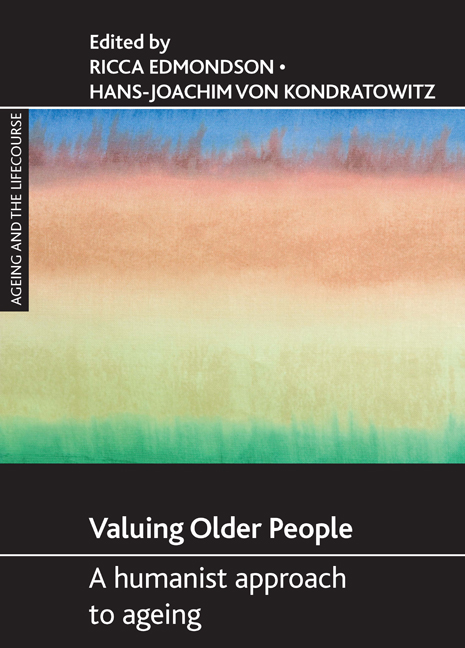Book contents
- Frontmatter
- Contents
- List of tables and figures
- Notes on contributors
- Acknowledgements
- Foreword
- Introduction
- Part One Religion, spirituality, cultural resources and creating meaning
- Part Two Norms, values and gerontology
- Part Three Ageing and wisdom? Conflicts and contested developments
- Afterwords
- Index
- Available titles in the Ageing and the Lifecourse series
nine - Ethos of care and environment in long-stay care settings: impacts on residents’ lives
Published online by Cambridge University Press: 05 July 2022
- Frontmatter
- Contents
- List of tables and figures
- Notes on contributors
- Acknowledgements
- Foreword
- Introduction
- Part One Religion, spirituality, cultural resources and creating meaning
- Part Two Norms, values and gerontology
- Part Three Ageing and wisdom? Conflicts and contested developments
- Afterwords
- Index
- Available titles in the Ageing and the Lifecourse series
Summary
Introduction
In Ireland around 4.6% of older people currently live in residential care (Department of Health and Children, 2006) in either public or private facilities. Older people living in residential care cannot always exercise the ‘consumer sovereignty’ that is attributed to purchasers of market services, and the power relationship between the providers of care and residents is an unequal one. People living in residential care might be afraid to criticise the services provided to them, concerned lest such action might have negative repercussions. In addition, many residents might have little or no support outside the residential care setting and therefore have no alternative but to accept the treatment given to them. There has also been international disquiet about the standards of care within some residential care facilities (OECD, 2005). Is there in fact reason for anxiety whether people living in residential homes in Ireland are – within reasonable limits – able to pursue their lives as they would wish? This chapter reports residents’ and staff 's perceptions of quality-of-life issues in residential care. In particular, it enquires about the influence of ethos of care and physical environment on the continuity of daily life. We felt that we could contribute most effectively to debate here by concentrating on issues that could be regarded as relatively immune from dispute. We focused, then, on what we could discover about practical arrangements for offering care to residents and on the constraints and opportunities their physical settings provided. These did, however, prove to have far-reaching implications about the kinds of lives our respondents enjoyed.
The study: life in residential homes
The findings reported in this chapter are part of a larger study of residents’ and staff 's perceptions of quality-of-life issues in residential care settings (Murphy et al, 2006). The study used mixed methods, incorporating both qualitative and quantitative elements: focus groups, a quantitative survey of residential facilities and qualitative interviews with residents and staff. The findings reported here arise from the qualitative interviews with 101 residents and 48 staff.
In Ireland, residential care settings divide into five types: health board geriatric homes or hospitals, health board welfare homes, health board district/community hospitals, voluntary geriatric homes/hospitals and private nursing homes. We conducted interviews in 12 study sites, chosen through purposive sampling to reflect the range of residential provision in Ireland.
- Type
- Chapter
- Information
- Valuing Older PeopleA Humanist Approach to Ageing, pp. 161 - 176Publisher: Bristol University PressPrint publication year: 2009

